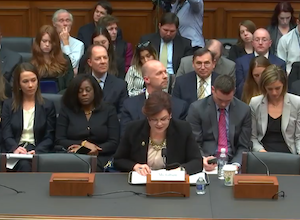The Kennedy Forum Policy Team has been very busy recently at both the state and the federal levels. Our state work focuses on improving adherence to the Federal Parity Law, which requires insurers to treat illnesses of the brain, such as depression and addiction, the same way they treat illnesses of the body, such as diabetes and cancer. We’ve provided legislation and technical assistance to state regulators to help states enforce parity. Our recent federal work has focused on legislation and regulations relevant to the opioid crisis.
On February 28, we attended the House Energy and Commerce hearing, “Combating the Opioid Crisis: Helping Communities Balance Enforcement and Patient Safety.” Representatives heard testimony from invited witnesses focusing on eight bills to amend the Controlled Substances Act. Each bill attempts to curb the crisis through enforcement measures meant to establish firmer controls on the prescribing, disposing, manufacturing, and dispensing of controlled substances. According to Chairman Greg Walden (R-OR), this is part of efforts in the House to move an opioid legislative package by Memorial Day. The package would bundle a handful of the more than 60 existing opioid-related bills currently in Congress, as well as other legislation expected to be introduced soon. Notably, the pieces of legislation focused on at this hearing were not ticketed with high-dollar authorizations. Instead, they focused on possible solutions through policy measures.
In contrast, one day after the House Hearing, Senators Sheldon Whitehouse (D-R.I.) and Rob Portman (R-Ohio) dropped the first bill to come forth as “CARA 2.0” – an expansion of 2016’s Comprehensive Addiction Recovery Act. The bill authorizes $1 billion toward its provisions, which include increased use of statewide Prescriber Drug Monitoring Programs, waivers on Buprenorphine patient caps, and a three-day limit on opioid prescriptions for acute pain. This authorization is most likely a suggestion on how the additional $6 billion dollars Congress included for opioid funding in the bipartisan budget agreement reached last month should be allocated. We are expecting many more pieces of legislation to influence the way these dollars are ultimately appropriated.
While some is better than none, the additional $6 billion included in the budget to directly address the opioid crisis is a pittance of what experts say is needed to address such a far-reaching complex problem. The allocation should be closer to $25 billion. Quite frankly, $6 billion is a far cry from what should be allocated to a crisis claiming the equivalent of a 9/11 every three weeks in lives lost. It’s also nothing compared to dollars put toward past public health crises, such as the HIV epidemic. The Kennedy Forum strongly believes potent policy solutions backed with substantial appropriations should be a priority of Congress moving forward.
At the state level, we have been working in concert with our national partners and their state affiliates to introduce legislation adapted from our model parity legislation. Title I of the model legislation requires insurers to submit analyses to state regulators as to how they are complying with some of the more complex components of the Federal Parity Law. It also provides state regulators with specific guidance on how to enforce the Federal Parity Law. These provisions are necessary because compliance with the complicated aspects of parity has lagged, and state regulators are often unsure of how to approach enforcement. Title II has requirements that would make it easier for people to access medication-assisted treatment (MAT) for substance use disorder care. While Title II is not strictly “parity,” eliminating insurance coverage barriers to MAT involving Buprenorphine (Suboxone), Methadone, and Naltrexone (Vivitrol) is crucial considering the opioid epidemic shows no signs of abating.
The Kennedy Forum has worked with advocacy partners and legislators in the states to introduce an adapted version of our model bill. Currently there are bills introduced in Connecticut, Florida, Illinois, Minnesota, Missouri, Mississippi, New Jersey, Pennsylvania, and Washington, D.C. We are also working with advocates and legislators to introduce bills in Arizona, Colorado, Delaware, Georgia, Massachusetts, Ohio, and Wyoming.
The policy team is also working with state regulators and affiliated entities to help them perform audits and investigations. We have been training state regulators on how to determine if insurers are in compliance with the Federal Parity Law. This includes helping them incorporate our compliance guide into their state’s compliance forms. There are currently 19 states and the District of Columbia that have federal grant money to perform parity compliance work (among other things).
Finally, The Kennedy Forum followed coverage from the White House Opioid Summit on March 1st. Other than the President’s unhinged comments suggesting that the U.S. should emulate countries like the Philippines – a country that has killed over 12,000 people in its recent drug war – members of the administration largely said the right things during the summit. However, they still have not acted on most of the recommendations put forth by the President’s Commission on Combating Drug Addiction and the Opioid Crisis. See Patrick J. Kennedy’s statement about that here. While it is nice to hear key figures such as Kellyanne Conway and Health and Human Services Secretary Azar proclaim strong feelings about helping American families, we need them to actually walk the walk. The time for summits, commissions, blueprints, and strategic plans is over. The Kennedy Forum will continue to push for adherence to the Commission’s recommendations to ensure true progress in addressing the opioid crisis.
The Kennedy Forum Policy Team
Tim Clement
Senior Policy Advisor
Torie M. Keeton
Research and Advocacy Advisor

